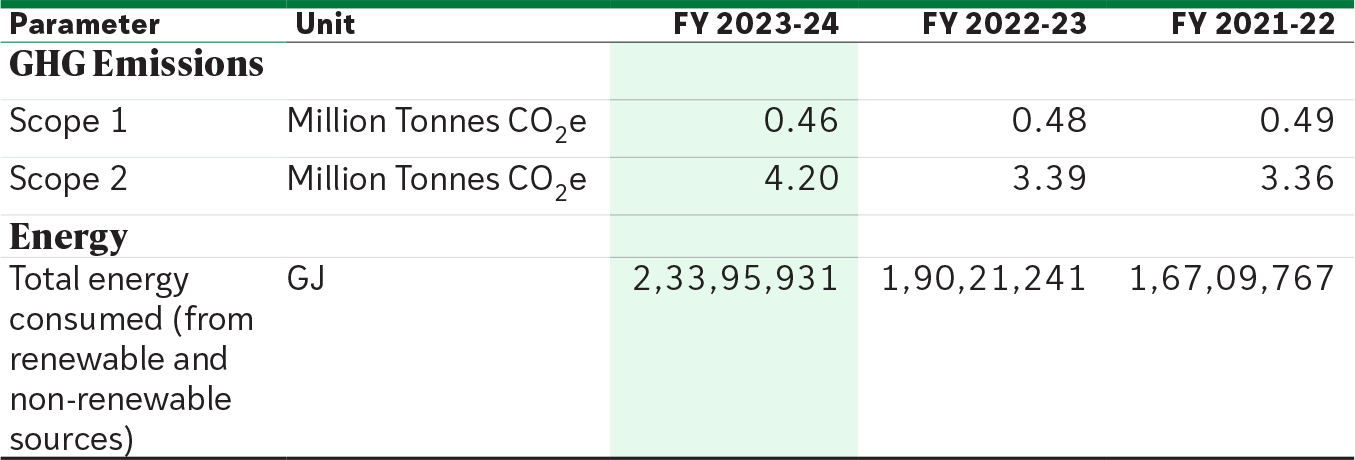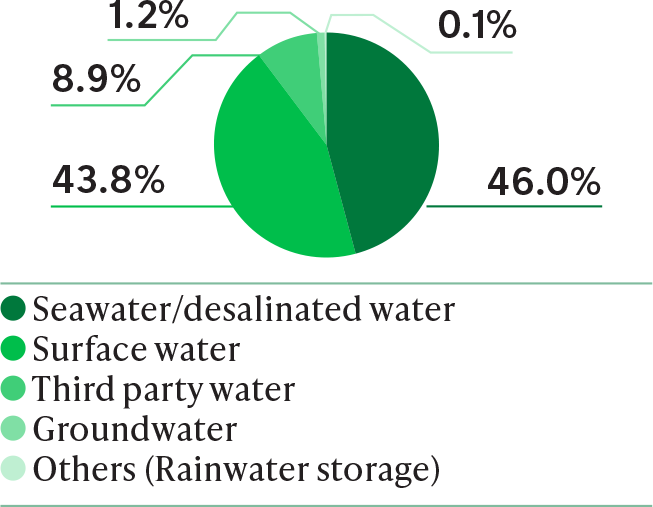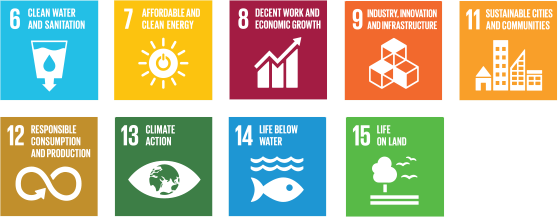Management Approach
Reliance has established a robust and
effective governance structure to monitor
its natural capital consumption, focusing
on key material topics. At the Board level,
the ESG Committee ensures effective
oversight, driving progress towards
achieving ESG goals. The Company’s
Health, Safety and Environment
(HSE) policy prioritises continuous
improvement of environmental practices
and minimisation of adverse impacts on
the environment and community. The
HSE policy is implemented by the Safety
and Operational Risk (S&OR) function,
which evaluates business strategies
quarterly and performs independent
environmental reviews at both the unit
and site levels. S&OR is the custodian
of the Operating Management System
(OMS) that drives safe, sustainable,
reliable and compliant operations.
Further, continuous monitoring and
auditing processes ensure compliance
with environmental regulations.
Making Judicious Use
of Nature’s Wealth
Managing
Environmental Impacts 
With its operations spanning various
industries, Reliance employs a crossbusiness
environmental management framework that focuses on managing
energy use; reducing, recycling and
reusing water and waste; minimising air
pollution; preventing soil contamination
and preserving biodiversity. Targeted
technological interventions and strategies
are employed to reduce energy and
water consumption and minimise waste
production, including the flaring and
venting of gases. Reliance has made
significant investments in retrofitting
equipment and machinery to reduce
environmental impact and energy use.
Additionally, a Continuous Emission
Monitoring System (CEMS) ensures
compliance with local emissions
standards for SOx, NOx and TPM.
Moreover, employees and contractors
are regularly trained on environmental
laws, pollution prevention techniques and
waste reduction strategies.
On World Environment Day, Reliance
Foundation launched “Plant4Life,”
a community-driven environmental
initiative focusing on supporting natural
resources, protecting livelihoods, building
capacities of communities to engage
in climate adaptation and environment
conservation. This programme kicked
off with a massive plantation campaign,
involving 70,000 hours of employee
volunteering and resulting in the
planting of over 5,09,000 saplings of 40
indigenous species.
AIR EMISSIONS AT RELIANCE*

* The above data is for RIL Standalone and other O2C entities. Air emissions for all
parameters
are reported using third-party stack analysis reports, except for NOx and VOC parameters at the
Jamnagar unit, wherein these are sourced from peers from the same sector.
Climate Change 
In line with its ambition of reaching Net
Carbon Zero by 2035, Reliance is placing
a strong emphasis on transitioning
from fossil fuels to renewable sources,
maximising sustainable materials and
chemicals as part of its portfolio, and
adopting carbon fixation, capture, and
utilisation technologies. The Company
envisions becoming one of the world’s
leading New Energy and New Materials
Company over a period of 15 years
through a strategic focus on clean energy
transition, making CO2 a recyclable
resource and replacing transportation fuel. More details related to this are
elaborated on Read more.
During FY 2023-24, significant progress
was made on the construction of the
Dhirubhai Ambani Green Energy Giga
Complex in Jamnagar and the first
giga-factory is scheduled to begin
production in the second half of CY24.
Further, the Company launched its first
commercial-scale Compressed Bio Gas
(CBG) plant in Barabanki, Uttar Pradesh
and plans to expand to 25 CBG plants
across India. The goal is to establish 100
CBG plants in the next five years, using
5.5 Million Tonnes of agro-residue and
organic waste, thus mitigating nearly
2 Million Tonnes of carbon emissions, and producing 2.5 Million Tonnes of
organic manure annually, significantly
reducing LNG imports. The Company
in collaboration with Indian Institute
of Technology Madras has initiated a
technology development programme for
CO2 utilisation in construction materials.
The Company has also made
advancements in two critical aspects
for delivering cost-competitive green
hydrogen and its derivatives: cost of
renewable power generation, and
installed cost of electrolyser for giga-scale
deployment. Further, the Company has
invested in strategic partnerships and
acquisitions, the details of which can be
found on Read more of this
report.
The Company is prioritising the
establishment of its battery Giga factory
by 2026. Further, it is fast-tracking the
commercialisation of its sodium‑ion
battery technology, with plans to
industrialise sodium-ion cell production
at a megawatt level by 2025. The Company will also invest in enhancing
the value chain, partnerships and future
technologies, including upstream and
downstream projects such as:
- Integrated PV manufacturing
from quartz to PV modules,
including building an ecosystem of
ancillary units.
- Battery chemicals and components,
cells and pack manufacturing and
energy storage system.
- Building an electrolyser and hydrogen
value chain.
- Power generation to ensure round-the-clock
availability for the production
of hydrogen.
- Power electronics systems required
to support renewable energy,
such as inverters, chargers and
DC‑DC converters.
- Renewable energy for mobility.
- Compressed biogas for
energy generation.
Responsible Energy Use across
Business Units
Oil to Chemical (O2C) and Exploration
and Production (E&P)
Reliance has actively integrated
sustainability practices, harnessing
6.85 Million GJ of renewable energy.
The Company has also implemented
biomass co-firing at Hazira and Dahej
manufacturing units. During FY 2023‑24,
Dahej and Hazira manufacturing units
together consumed 6.3 Million GJ of
renewable energy which accounts
for about 92% of Reliance’s total
green energy consumption for the
year. Additionally, the Hoshiarpur
manufacturing unit has started using rice
husk-based in-house steam generation,
aligning with Reliance’s goal of reducing
the consumption of fossil fuels. Moreover,
Hazira and Barabanki manufacturing
divisions have begun intermittently
importing green power from the grid as
part of ongoing sustainability efforts.
O2C AND E&P’S GHG EMISSIONS*
* The above data is for RIL Standalone and other O2C entities.
Note: In the Jamnagar unit, emission factors except CO2 in Scope 1 are sourced from peers
from the same
sector. Other units refer to IPCC guidelines for
emission factors. Further, grid emission factor for Scope 2 is sourced from the Ministry of Power.
Reliance Retail
Reliance Retail continues to focus on
energy-saving initiatives, including LED
fitting across all sites, installation of solar
projects at company-owned supply chain
sites, use of battery power equipment
in material handling, thermal reflective
coatings, use of natural lighting and high-volume,
low-speed fans.
Reliance Jio
Under the Science Based Targets initiative
(SBTi), Jio has committed to achieve
Net Zero target. By FY 2028-29, the
Company aims to lower its absolute
Scope 1 and Scope 2 emissions by 76%
and Scope 3 emissions by 66.5%, using
FY 2020-21 as the baseline. A pivotal
part of this commitment is to increase the
sourcing of renewable electricity from
1.2% in FY 2020-21 to 100% by FY 2029-
30 and maintain this level thereafter.
(Note: The financial year is considered as per the
global calendar for science based target.)
Reliance Jio has installed over 174
MWp of solar power across more than
20,000 sites in India and is now exploring
wind power and methanol fuel cells to
further decrease its carbon footprint.
Jio emphasises on several initiatives
to reduce its emissions, including
leveraging digital connectivity for
meetings, implementing smart sensors
and robotics, integrating AI, adopting
the waste management principles, and collaborating with customers and
suppliers to develop sustainable products
and services. In 2023, Jio received an ‘A’
score from CDP in climate change, which
is in the Leadership band.
RELIANCE JIO’S GHG EMISSIONS AND ENERGY CONSUMPTION

Energy Efficiency
of Operations 
Reliance continues to adopt state-of-
the-art technologies and process
improvements to enhance energy
efficiency across its businesses. These
initiatives have resulted in substantial
energy savings of 5.28 Million GJ in
FY 2023-24.
FY 2023-24 Energy
Consumption at Reliance
The energy management policy of
Reliance drives the Company’s strategy
to manage energy based on the five
tenets of energy management as
detailed on page 115 of this report. For
FY 2023‑24, total energy consumption
for O2C and E&P was 506.18 Million
GJ, of which 6.85 Million GJ was from
renewable sources. Of the total energy consumed, 500.24 Million GJ was from
fuel consumption while 5.94 Million GJ
was from electricity consumption. Total
energy includes non-renewable energy
from fuels like Fuel Oil, Fuel Gas, Syn Gas,
Diesel, FCC Coke, Coal and Natural Gas
etc., and renewable energy from biogas,
biomass and solar energy. Further, major
units like refinery and petrochemical
complexes determine calorific values of
fuel through sample testing in internal
NABL-accredited labs. Other units use
calorific values from IPCC guidelines.
Reliance is striving to reduce its carbon
footprint by sourcing biomass as an
alternative fuel for its Dahej and Hazira
sites. This year, RIL has consumed 8.6%
and 4.0% of total energy consumption
through green energy sources at these
sites, respectively. The Company has
implemented a range of initiatives
to enhance energy efficiency and
promote resource conservation. These
measures include energy optimisation
projects, waste heat recovery systems
and equipment upgrades. This year,
the volume of flared and vented
hydrocarbons was 0.14 Million MT.
Jio’s total energy consumption for the
reporting year was 23.40 Million GJ, of
which 7,38,039 GJ came from renewable
sources. In line with its SBTi commitment,
Reliance Jio continues to focus initiatives to
optimise energy usage across its facilities.
Ecosystem
and Biodiversity 
Reliance is committed to actively
preserving biodiversity and aims to have
a net positive effect on it. The Company
performs impact assessments for
applicable projects on biodiversity and
regularly monitors ecosystem health. By
continually engaging with stakeholders
and collaborating with partners, the
Company seeks innovative methods to
advance its environmental objectives.
Across India, the Company has planted
over 2.44 crore saplings, contributing to
the development of greenbelts spanning
over 6,500 hectares. In FY 2023-24
alone, more than 5 lakh saplings were
successfully planted. Further, through
Reliance Foundation, the Company has
taken several initiatives that exemplify
its commitment to environmental
stewardship like the plantation drive,
adoption of the Miyawaki method for afforestation and mangrove restoration in
Odisha and West Bengal.
Waste Management
and Circular Economy 
Reliance continues to place strong
emphasis on waste management and
circularity initiatives across its businesses
such as PET recycling, chemical recycling
(pyrolysis oil), polyolefin recycling,
recycling the hazardous waste as
alternative fuels and raw materials, zerowaste
stores, among others. Further, the
Company is making steady progress on its
circularity focused projects that includes
the innovative ReRoute™ product,
sustainable packaging, development and consumer adoption of the R|ELAN™
fabric, commercialisation of the RCAT-HTL
technology and development of circular
polymers. The Company’s integrated
refining and petrochemical complex
in Jamnagar, India, has achieved the
International Sustainability & Carbon
Certification (ISCC) Plus certification for
producing circular polymers, branded
as CircuRepol™ and CircuRelene™, by
chemically recycling plastic waste-based
pyrolysis oil. Further, the Company
complies with Extended Producer
Responsibility (EPR) Guidelines and Plastic
Waste Management Rules, ensuring
responsible disposal and recycling
practices are implemented throughout
its operations.
WASTE GENERATION AT RELIANCE IN FY 2023-24

* The above data is for RIL Standalone and other O2C entities.
Water and
Effluent Management 
Reliance implements a comprehensive
strategy to reduce freshwater usage
through increased water recyclability,
reuse of treated water and minimising
external discharge. The Company has
invested in automation to improve
operational efficiency, resulting in
reduced water consumption. Further,
the Company continues to focus on
expanding rainwater harvesting,
enhancing water efficiency in
manufacturing processes and using
treated wastewater. During the year, the
Company* withdrew a total of 227.58
Million Kilolitres of water, with 37.81
Million Kilolitres discharged and 104.78
Million Kilolitres recycled. Of the water
discharged, 74.3% was released into
seawater, 23.5% into surface water
and the remainder was discharged as
third-party water. Additionally, the E&P
Division reported 5.22 Million Kilolitres of
produced water.
* The above data is for RIL Standalone and other
O2C entities.
RELIANCE’S WATER
CONSUMPTION BY SOURCE*

Way Forward
Reliance is reshaping its
operational strategies to reach
its ambitious goal of achieving
Net Carbon Zero by 2035. The
Company continues to make
considerable investments,
focusing on R&D and actively
pursuing strategic partnerships
to decarbonise its operations and
shift from fossil fuels to more
sustainable and cleaner energy
sources. These collaborations
are pivotal in facilitating the
transition to clean energy.
![]() Managing
Environmental Impact
Managing
Environmental Impact![]() Climate
Change
Climate
Change![]() Energy Efficiency
of Operations
Energy Efficiency
of Operations![]() Ecosystem
and Biodiversity
Ecosystem
and Biodiversity![]() Waste Management and
Circular Economy
Waste Management and
Circular Economy![]() Water and
Effluent Management
Water and
Effluent Management





